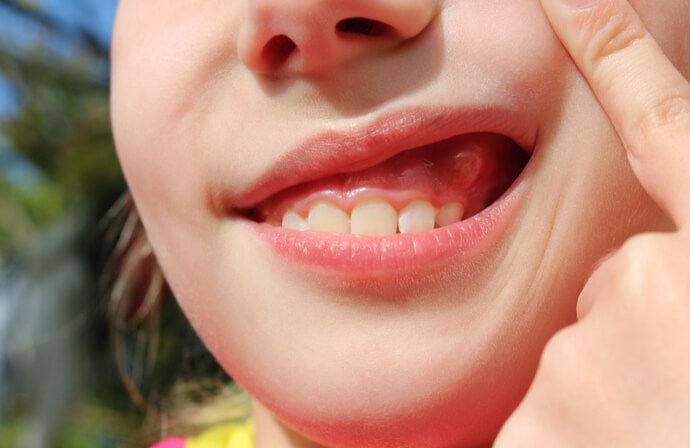Gums should not hurt! If your gums are hurting, there is a reason why.
This blog will discuss the most common reasons that cause gum pain and what you can do about it.
Sore Gums Causes

What does it mean if your gums hurt?
There are several possible causes for sore gums as follows:
1. Poor oral hygiene – The most common cause of sore gums is poor oral care.
Bacteria in the mouth, combined with plaque and tartar, can lead to inflammation of the gums (gingivitis).
If this condition is not treated, it can progress to periodontal disease.
2. Trauma – Another common cause of sore gums is trauma.
This includes biting your tongue or cheek and chewing on ice or hard candy for too long.
Having braces that are too tight can also cause gum trauma.
3. Diseases – Several diseases can cause swollen gums. Examples include diabetes, vitamin deficiencies,
rheumatoid arthritis, Sjogren’s syndrome, and systemic lupus erythematosus.
4. Medications – Some medications can cause sore gums as a side effect.
Examples include blood pressure medications, antidepressants, and some antibiotics.
5. Allergies – Food allergies are among the most common causes of mouth sores (aphthous ulcers).
Common foods that cause allergic reactions include wheat, dairy products, peanuts, and seafood.
6. Stress – Stress can be a major cause of mouth sores.
This is especially true for people who have an anxiety disorder or are going through a stressful time in their life.
7. Injuries – Injuries to the mouth can cause oral sores.
These injuries may be caused by biting your cheek or tongue and grinding your teeth.
Getting hit in the face with a ball may also injure your mouth.
8. Herpes – People who have herpes may experience recurrent episodes of oral sores.
9. Hormonal changes – Hormonal changes, such as those that occur during pregnancy or menopause, can lead to oral sores.
Women who are pregnant often develop mouth ulcers because of the high levels of hormones in their bodies.
Oral ulcers are also common during menopause because of hormonal fluctuations.
10. Illness – Viral illnesses and bacterial infections can cause mouth ulcers.
The immune system fights off these illnesses by releasing antibodies that attack the invading germs.
These antibodies mistakenly attack healthy cells in the mouth and cause oral sores in some cases.
11. Medications – Certain medications can also cause mouth ulcers. Antibiotics,
aspirin, and certain blood pressure medications are the most common culprits.
To find out exactly what causes gums to hurt, it is important to schedule an appointment with your dentist as soon as possible.
Relief and Treatment of Gum Sores

Gum sores are a common consequence of gum disease.
Bleeding gums are often the first indication of gum disease and can also be a symptom of other medical conditions.
Gum sores can be treated with a variety of medications or home remedies.
- A dental care provider may prescribe topical antibiotics.
- A person should continue brushing their teeth but avoid the area where the sore is present.
- Gargling with salt water may help relieve pain and reduce swelling in the mouth.
- Some people may find relief by placing an ice pack on the sore area.
- Rinsing with baking soda and water can help prevent gum sores from recurring.
Gum pain and Soreness Prevention

Gum pain and soreness can be caused by various factors, from ill-fitting dentures to plaque buildup.
It is typically more painful when you first wake up in the morning. Yet it is also common for it to get worse throughout the day.
There are many different ways to soothe your sore gums throughout the day.
- Drink extra fluids. Water and foods with high water content can help wash away food residue and plaque.
- Keep your mouth clean: Brush your teeth at least twice a day with soft bristles and mild toothpaste.
- Floss daily to scrape away food particles and plaque that can cause gum inflammation.
- Try a mouthwash with fluoride to help reduce bacteria in the mouth.
- Drink less alcohol. Excessive alcohol consumption can lead to oral infections and dry mouth, increasing your risk of gum disease.
- If you smoke, quit smoking. Smoking increases the risk of periodontal disease because it reduces blood flow to the gums and increases plaque accumulation around teeth.
- Eat a healthy diet. Foods rich in vitamin C may help protect against gum disease by boosting your immune system and strengthening your gums.
Examples of which are strawberries, broccoli, bell peppers, and citrus fruits - Reduce stress. When you’re stressed, your body produces more cortisol, which can make your gums more vulnerable to gum disease.
- Brush and floss regularly. Brushing twice a day and flossing once a day will help keep plaque from building up around your teeth.
- Make sure your dental hygiene routine includes a dental appointment every six months for professional cleaning and checkup.
A dental cleaning removes plaque from above and below the gum line, which helps prevent periodontal disease.
Seek Experts’ Help

Gum pain and soreness prevention start with a routine oral health examination and cleaning.
At Brownstone Dental, we have the equipment to ensure your teeth are healthy.
We also have a team of highly trained dental professionals who can provide you with gum pain and soreness prevention tips.
Contact or visit us at our main office in Houston, TX for medical advice.